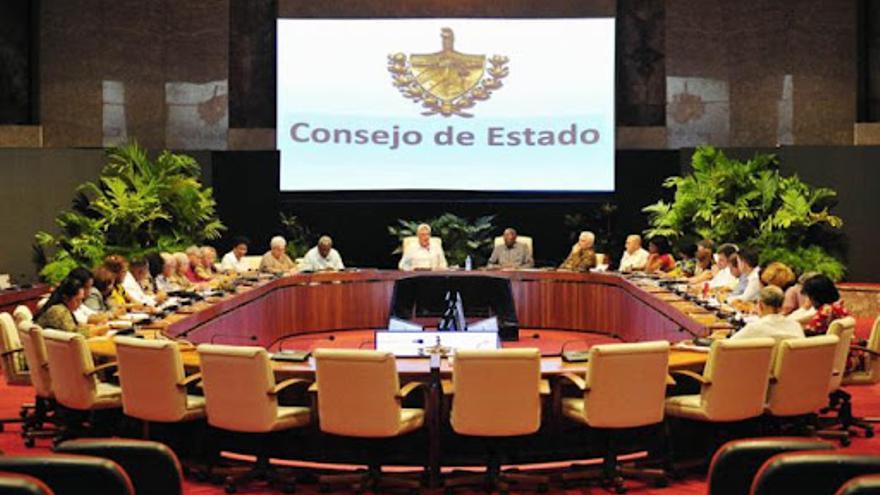
![]() 14ymedio, Reinaldo Escobar, Havana, 9 September 2021 — Political intrigues have been fruitful in Cuba, especially since 1959. The deposition of President Urrutia, the microfraction, the Marquitos trial, the execution of General Ochoa and, more recently, the dismissal of the dauphins Carlos Lage, Felipe Pérez Roque and Carlos Valenciaga are partially known facts that show dark machinations alien to the proclaimed political principles.
14ymedio, Reinaldo Escobar, Havana, 9 September 2021 — Political intrigues have been fruitful in Cuba, especially since 1959. The deposition of President Urrutia, the microfraction, the Marquitos trial, the execution of General Ochoa and, more recently, the dismissal of the dauphins Carlos Lage, Felipe Pérez Roque and Carlos Valenciaga are partially known facts that show dark machinations alien to the proclaimed political principles.
After the death of Fidel Castro, in November 2016, they did not stop.
Today’s palace intrigues have protagonists and purposes. Names are known because they appear on the list of the Political Bureau, the Council of State and Ministers or because they bear certain surnames, but the inclination of each towards the only two possible purposes cannot be confirmed with certainty: to maintain the system or to liquidate it.
They all share, perhaps, a parallel objective, not related to ideals but to personal ambitions. Understand, enjoy the obscene attributes of power, those honeys that must be tasted with discretion but that are the most effective motivation to agree opportunistically or to conspire in the shadows, as the case may be.
Today there is no conspiracy in the upper echelons, as in 1959, to avoid or promote communist ideology, nor to, as in the 1960s, to approach the Soviet Union or China. No one is plotting to start a tropical perestroika anymore. Not even in the local academy do purists of Marxism appear confronting its reformers. No one has ever consulted the books on the political economy of socialism by P. Nikitin or cited the manuals of scientific communism, where it was claimed that humanity was experiencing the transition period from capitalism to socialism.
The most critical dilemma does not seem to be whether or not to proceed with the liquidation of the system (if it can be called that) but how to carry it out and when.
The debate has not yet emerged nor is it recorded in the minutes. Flashes only appear when the promulgation of a decree is prioritized or the presentation of laws to Parliament is delayed without explanation. You can see certain sparks in the advances and setbacks of the acceptance of the market rules or in the absurd prohibitions and timid permissiveness.
In the corridors of the Palace, in the halls of the Capitol, in the ministerial offices, change must be cooking. An enigmatic smile, raised eyebrows, a greeting, will be enough to create complicity. But the opacity in the deep opinions generates doubs and suspicions.
Much is debated about the role that this entelechy called “the military leadership” can play. Here we must distinguish the generals who have taken over the economy through the business group called Gaesa, from the commanders who have the operational capacity to mobilize troops. In parallel, the powerful political police have the mission of discovering any fickleness that could be considered as a presumed treason.
The absence of a transparent and democratic political debate makes anyone who tries to forge alliances to drive change a presumable traitor. The President of the Republic does not commit a crime, not even a mistake, if he orders State Security to seize documents in the offices of opposition parties. It does not engage in Watergate because opposition parties do not have a permit to exist and what is considered illegal is that they issue and keep documents.
That is the reason why the public does not even know who is in favor or against an article of a law, who has an open-minded tendency or who is part of the mechanisms to stop reforms. Everyone is supposed to agree before starting to argue, because unity is not only expressed in action, but also in thought.
The obsession with showing a monolithic union around continuity is intended to give the impression that “up there” everything is under control.
This unitary staging is aimed at the institutions and governments that exert pressure from abroad, the citizens residing on the island, the repressive forces that keep any discrepancies at bay and, very especially, that small group of characters of the so-called ’historic generation’. Although they have not appeared on the payroll of power since the Eighth Congress of the Party, they maintain “one foot in the stirrup” ready to defend their designs at any cost.
Sooner rather than later, the laws of biology will leave the watchmen of that immobile legacy out of the game and the actors in this farce, no longer masked, will want to show themselves to the world and to the people as the only ones capable of carrying out a controlled liquidation, without a power vacuum, bloodbaths or the piñatas of corruption; providers of amnesty and deserving of pardon.
Meanwhile, citizens remain oblivious to the affairs of politics and are amazed how in Spain they flay the political party Podemos, in Chile the president apologizes and promotes a change in the Constitution, in Peru they limit the powers of the president and in the United States he is accused of fraud against the party that won the elections. “Nothing like that happens here,” some think, as if it were a choir of angels that rule the country and not a pack of hungry wolves ready to tear each other apart.
____________
COLLABORATE WITH OUR WORK: The 14ymedio team is committed to practicing serious journalism that reflects Cuba’s reality in all its depth. Thank you for joining us on this long journey. We invite you to continue supporting us by becoming a member of 14ymedio now. Together we can continue transforming journalism in Cuba.
